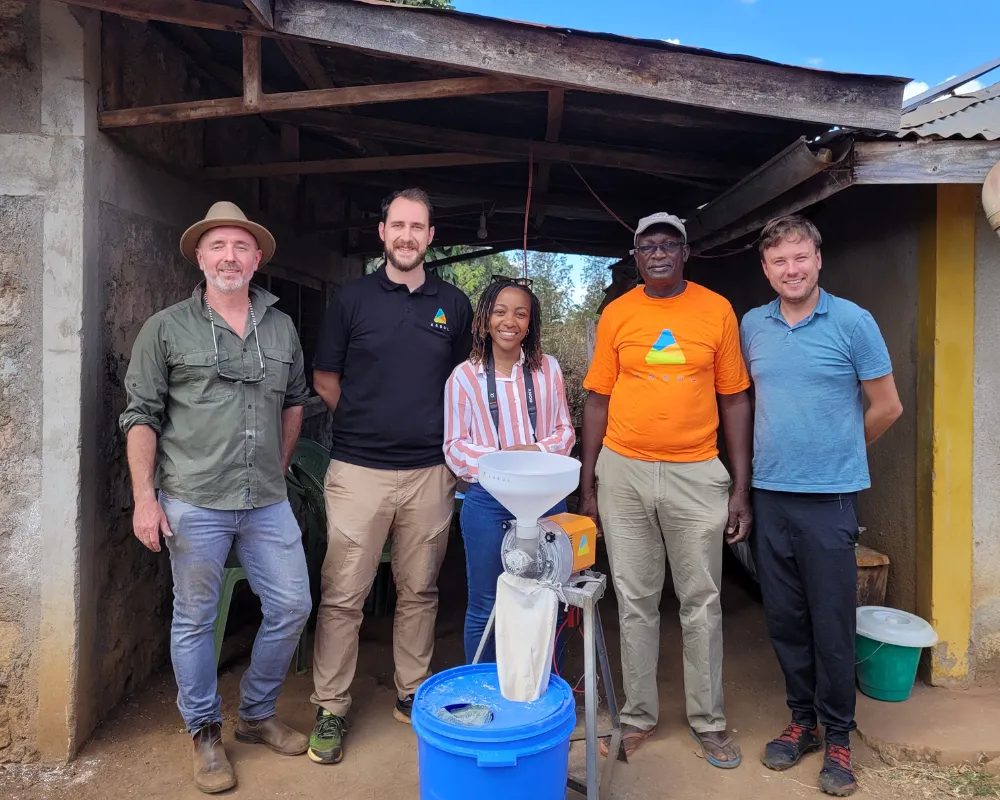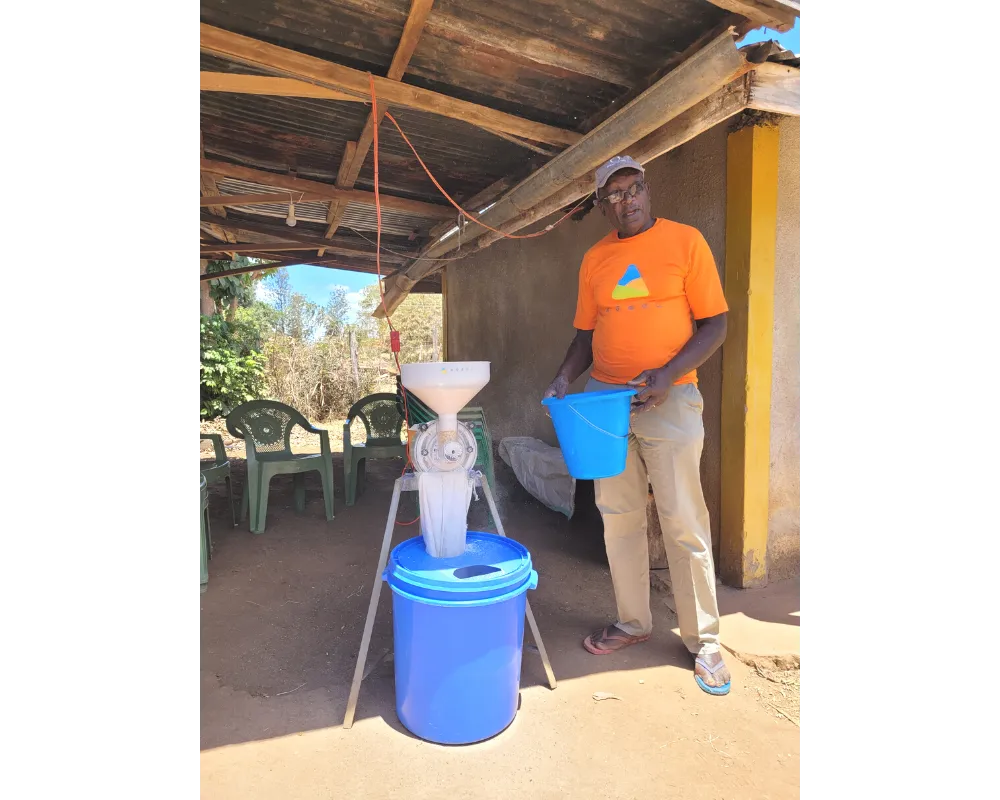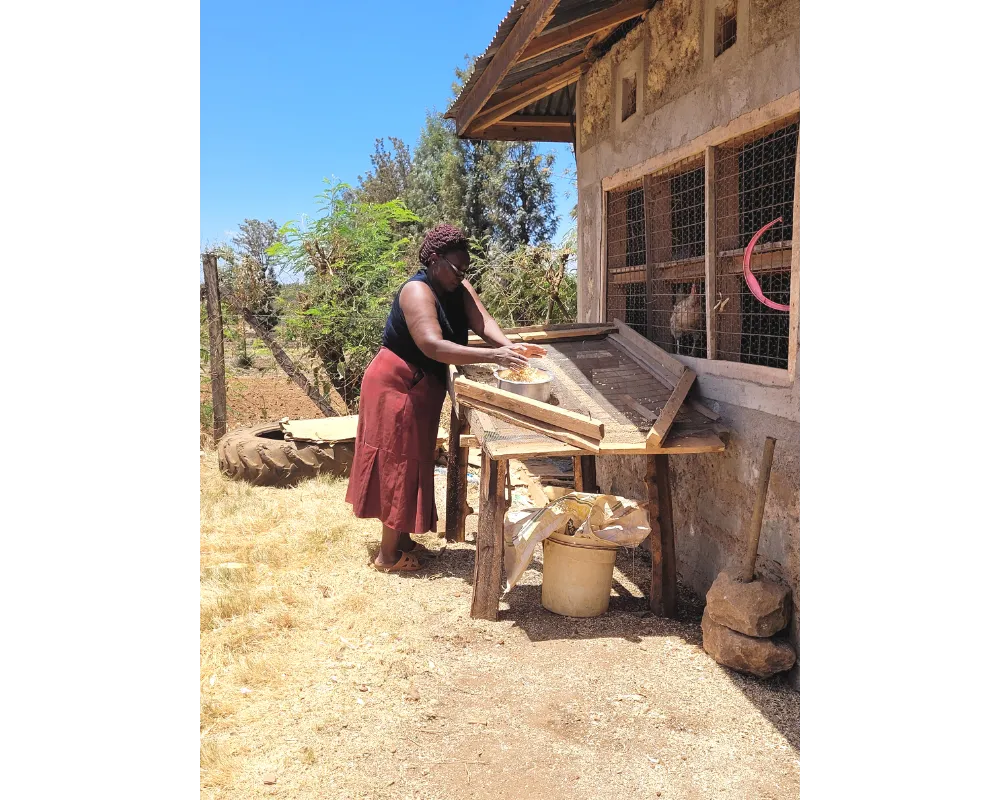Serving the Community and Earning Extra Income through Efficient Solar Milling
The Efficiency for Access team spoke to Wilfred Muriithi, an Agsol solar mill owner in Kenya, to learn more about his ownership journey and user experience.

The Efficiency for Access team spoke to Wilfred Muriithi, an Agsol solar mill owner in Kenya, to learn more about his ownership journey and user experience. Agsol is an Efficiency for Access Research and Development Fund grantee and has received support in developing its flagship product — the Agsol MicroMill.
Wilfred Muriithi proudly refers to himself as a ‘solar man.’ ‘I am using solar for lighting, solar for pumping and solar for milling. I’m a solar man.’ But his solar reliance has been borne out of necessity. Despite an ambitious national electrification plan and the installation of electricity poles close to his home, Wilfred and his wife, like many other rural Kenyans, are yet to be connected to the national grid. Wilfred says the government set up the wiring for electricity supply in his area three years ago but has still not installed a transformer.

They live in Mbinguini, one of the smaller localities in Mwea, Kirinyaga County, Kenya, about two hours from Nairobi by road. Wilfred is a retired groundwater and agriculture engineer who previously worked with the government on soil and water conservation and is now an independent specialist in spatial water resource mapping.
Since Wilfred is often away from home on water prospecting trips, his wife is the one who mainly works with their Agsol mill and grinds flour for customers. So far, they are both immensely happy with the MicroMill, which they say works excellently and is reliable.

‘This [mill] is very easy to use…I have not encountered any issues. Even during very cloudy days, it is still functional.’
Wilfred discovered the Agsol solar mill during a water prospecting field visit. In addition to helping his customers identify groundwater sources, he trains them on drip-irrigation system installations and often promotes SunCulture solar water pumps for irrigation systems. On one such pump installation, Wilfred was introduced to the solar mill by the SunCulture team.
Already aware of the cost-saving benefits of solar-powered technologies, Wilfred was immediately interested in the innovative mill. For him, Agsol’s MicroMill presented a convenient option for flour production to meet his family’s needs and income generation through milling for his neighbours.
Access to a posho mill is crucial in many rural communities in Kenya. Families in these areas rely on them for their household and farming milling needs — citing that posho mill flour is more nutritious and palatable than flour from milling factories. Additionally, many rural Kenyan households (70%) rely on small-scale agriculture to earn a modest living and feed themselves. Because of this, crops such as maize, cassava, and millet are often readily available to them. The families typically harvest the produce from their farm and take it to the closest miller to make flour. This is then used to prepare popular local meals such as ugali (maize meal dish) and millet porridge — which are staples in rural homes.
Beyond household consumption, small-scale farmers can save on buying expensive commercial animal feed by milling the crops they grow to produce feed. Despite the undeniable benefits of milling for day-to-day rural-household demands, the posho mills are often inconvenient to access — often located at market centres many kilometres away. Women and children often walk long distances to the market centre to access a posho mill. The time spent travelling and then waiting for the flour to be milled could go towards more meaningful activities, e.g., studying, spending time with family or participating in income-generating activities. Additionally, many posho mills run on petrol or fuel, making them pollutive for the environment and costly due to recurring fuel costs.
For Wilfred and his neighbours, the closest posho millers in their area are at least three kilometres away. Wilfred offers his customers more convenient access to milling services and provides the service at about two-thirds the cost of the traditional posho millers. He charges KES 20 (USD 0.16) for two kilogrammes compared to the posho miller’s rate of KES 30 (USD 0.24). Additionally, the quality of the flour that Wilfred provides is superior to that of the diesel posho millers, which often taste of diesel fumes.
A changing climate
Unfortunately, Wilfred could not rely on customer revenue to pay off the mill’s financing due to the severe drought affecting his home area and other parts of Kenya for most of this year, coupled with challenging economic conditions. He reported that milling orders have been much lower this year than in 2021 because people haven’t grown much maize. Neighbours often mill small quantities that only meet their daily meal requirements. He also mentioned that they sometimes mill on credit, and he allows a neighbour to pay for what they milled during their next visit, often a few days later. On average, the solar mill generates KES 100–300 (USD 0.82 -2.45) daily at least three times a week.
I am not alone. Everybody is affected by these harsh economic times. Especially those who had employed people to rely on a salary from their mill — they have closed down.

Despite the dwindling quantity of milling orders, Wilfred is optimistic that his business will become more profitable. He has identified several business opportunities to widen his customer base, including partnering with the local schools to mill their flour weekly and possibly employing someone to provide mobile milling services at the local markets. He says the government has plans to reintroduce indigenous crops, such as millet, cassava and sorghum, in the region to boost food security and improve nutrition. Once underway, the increased crop production would provide another growth opportunity for his milling business. Finally, he is keen to stop buying commercial chicken feed by milling a more nutritious blend of homemade feed, which will be comparable to store-bought feed.
Wilfred and his wife’s story showcases how adopting a solar mill enables convenient and affordable milling services for rural Kenyan communities while avoiding carbon emissions. Efficiency for Access has been working with Agsol since 2018, both in research and R&D. The Efficiency for Access Research and Development Fund supported Agsol in two projects — the first project was to develop a MicroMill prototype and the second project involved further improvements to the prototype, including efficiency gains and improved affordability. The R&D Fund’s support has helped Agsol create a highly efficient, more affordable small grain mill with a strong product-market fit.
Agsol is based in Kenya and was established in 2016 to develop solar-powered milling machines that can viably serve small communities, improve labour efficiencies, keep more money in rural economies, and catalyse access to higher-tier energy services.